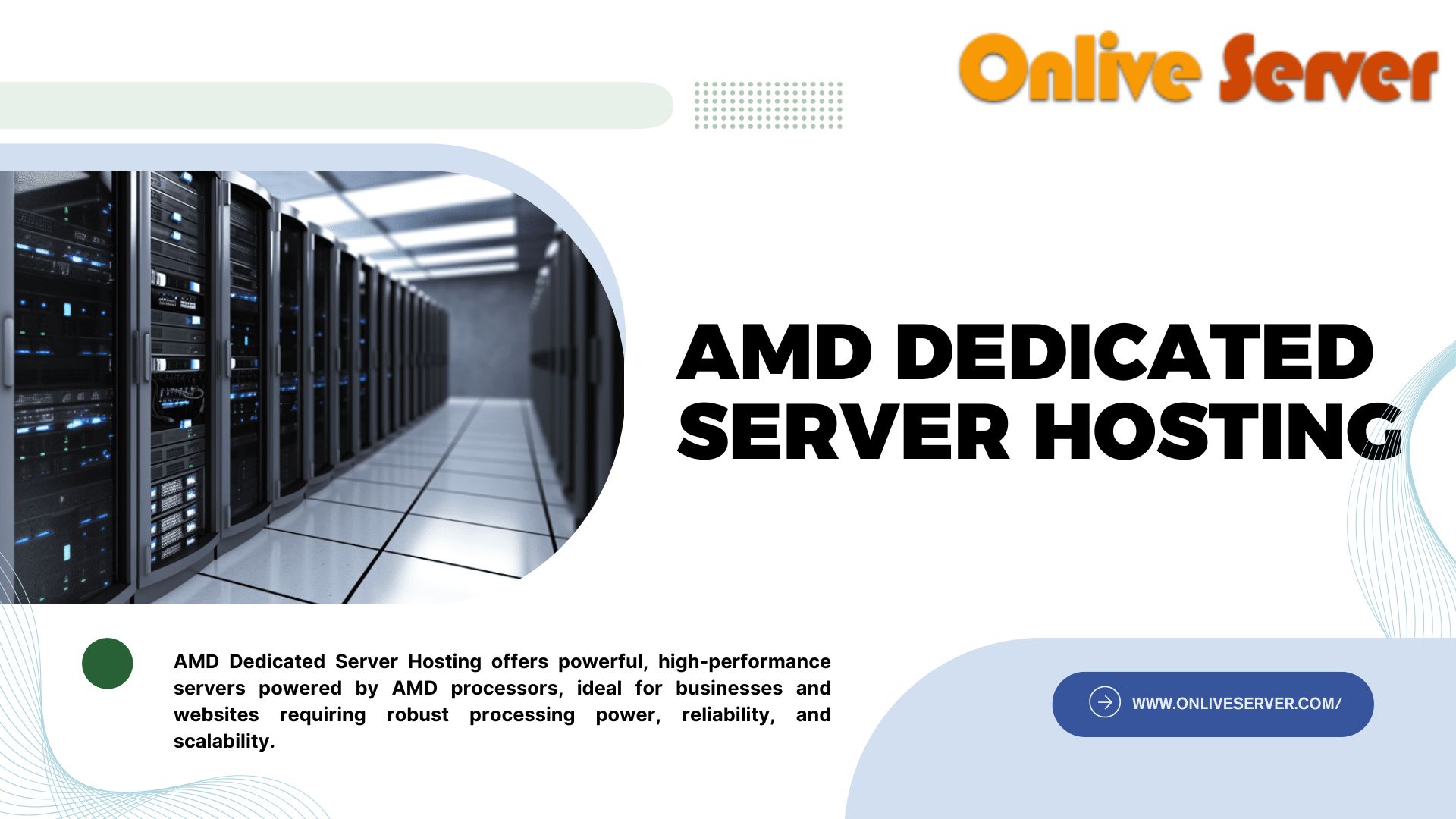Businesses need robust, reliable, high-performance hosting solutions to keep up with demanding workloads. Whether running complex applications, hosting multiple websites, or managing a resource-intensive game server, dedicated server hosting remains one of the best choices.
AMD (Advanced Micro Devices) has entered the scene with full force, offering an incredible balance of performance, cost-efficiency, and energy optimization. In this blog, we’ll explore the benefits of AMD Dedicated Server Hosting, why it’s gaining so much traction.
What Is AMD Dedicated Server Hosting?
Simply put, Hosting is a type of hosting in which the server’s hardware is powered by AMD processors—most commonly the EPYC or Ryzen series.
Unlike shared hosting, where you share resources with others, dedicated hosting gives you exclusive access to all the server’s power. With AMD processors at the heart, these servers deliver superior multi-threading capabilities, enhanced data throughput, and outstanding performance-to-price ratios.
How AMD Dedicated Server Hosting Works
AMD Dedicated Server Hosting provides businesses with a physical server exclusively powered by AMD processors, such as the EPYC or Ryzen series, offering high performance, security, and scalability. Unlike shared hosting, where resources are divided among multiple users, a dedicated server ensures that all of the server’s resources—such as CPU, RAM, and storage—are allocated solely to one user, ensuring optimal performance. These AMD-powered servers are designed to handle demanding workloads.
Why Choose AMD Over Others?
- Cost-Effective Powerhouse
AMD servers are usually more affordable than their Intel counterparts while providing equal or better performance. This makes them perfect for startups and mid-sized businesses looking for great value.
- High-Core Count
AMD’s latest EPYC processors offer up to 96 cores in a single processor. That’s ideal for virtualization, machine learning, big data processing, and other multi-threaded tasks.
- Better Power Efficiency
AMD chips use less energy, which means lower cooling costs and a smaller carbon footprint—perfect for companies aiming to be eco-friendly.
- Top-Tier Security Features
AMD EPYC processors come with Secure Encrypted Virtualization (SEV) and Secure Memory Encryption (SME) to protect your data from unauthorized access.
- Support for PCIe 4.0 and 5.0
This means faster data transfer, better SSD performance, and increased bandwidth—all leading to a snappier user experience.
Use Cases for AMD Dedicated Server Hosting
Web Hosting Companies
If you run a hosting business, AMD servers help you offer reliable and fast services to your customers without breaking the bank.
Game Server Hosting
Game servers demand low latency and high computational power. AMD’s multi-core processors handle these loads efficiently.
Big Data & Analytics
Do you need to crunch huge volumes of data? AMD EPYC’s core makes it a fantastic choice for big data processing.
AI & Machine Learning
Training machine learning models? AMD servers can reduce time and cost compared to other solutions.
Enterprise Applications
Run your CRM, ERP, and databases with confidence. AMD provides the muscle and the memory bandwidth to support them all.
Features That Make AMD Dedicated Servers Stand Out
- Higher Thread Count
More threads mean more tasks can be processed simultaneously. This is a blessing for multitasking environments like virtualization and containerization.
- Memory Bandwidth
AMD EPYC supports 8-channel memory, giving your apps more bandwidth than Intel’s 6-channel support.
- Virtualization-Ready
Because of their architecture, AMD processors are a dream for virtualization. You can run multiple virtual machines (VMs) with smooth performance.
- Scalability
Need to upgrade later? AMD dedicated servers are built to scale, allowing seamless storage, memory, and processing power upgrades.
- Advanced Security
Thanks to built-in hardware-level encryption, your data stays secure even if the OS is compromised.
Selecting the Right AMD Dedicated Server for Your Needs
Selecting the right AMD Dedicated Server requires carefully assessing your specific performance, scalability, and budget requirements. Start by considering the processor type, such as the AMD EPYC series, which is ideal for resource-intensive applications due to its high core and thread count. Evaluate the RAM and storage requirements based on your workload—whether you need SSD or NVMe storage for faster data access. Consider future scalability; ensure the server can be easily upgraded as your business grows. Bandwidth and network connectivity are key factors, especially for high-traffic websites or applications.
Conclusion
If you’re looking for top-tier performance, advanced security, energy efficiency, and value for money, AMD Dedicated Servers tick all the right boxes. They’re ideal for businesses of all sizes—from small startups to large enterprises—that don’t want to compromise on speed, scalability, or cost.
Whether upgrading from shared hosting or migrating from another Dedicated solution, AMD is a investment that will pay off in performance and savings.
(FAQs) About AMD Dedicated Server Hosting
- What makes AMD dedicated servers different from Intel servers?
AMD servers generally offer higher core and thread counts, better memory bandwidth, and greater power efficiency—often at a lower price than equivalent Intel servers.
- Are AMD dedicated servers suitable for gaming?
Yes, AMD servers, especially those using Ryzen or EPYC processors, offer excellent performance for game hosting, ensuring low latency and high concurrency.
- Is AMD better for virtualization?
Absolutely. AMD EPYC processors offer superior multi-threading, which is ideal for running multiple virtual machines (VMs) or container-based applications.
- Can I use an AMD dedicated server for web hosting?
Many hosting companies use AMD servers to host multiple websites, databases, and applications, offering both performance and cost-efficiency.
- What kind of applications run best on AMD servers?
Applications involving high CPU usage, such as AI/ML models, video rendering, virtualization, database management, and big data analytics, perform extremely well on AMD servers.









